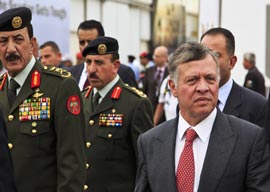
February 06, 2015

King Abdullah II of Jordan
Source: Shutterstock
Hence, is it wise for Jordan to become a front-line fighting state in a war, which, if it prevails, will mean a new lease on life for the Assad regime and a victory for Iran, the Shia militias in Iraq, and Hezbollah?
Critics argue that after making his commitment to “degrade and defeat” the Islamic State, President Obama has provided neither a war strategy nor the military resources to carry it out. And they are right.
But this is just another case of the president drawing a red line he should never have drawn. While U.S. air power can hold back the advance of ISIS and “degrade,” i.e., contain, ISIS, the destruction of ISIS is going to require scores of thousands of troops.
Though the Iraqi army, Shia militias and Kurds may be able to provide those troops to retake Mosul, neither the Turks nor any other Arab nation has volunteered the troops to defeat ISIS in Syria.
And if the Turks and Sunni Arabs are unwilling to put boots on the ground in Syria, why should we? Why should America, half a world away, have to provide those troops rather than nations that are more immediately threatened and have armies near at hand?
Why is defeating 30,000 ISIS jihadists our job, and not theirs?
With this outrage, ISIS has thrown down the gauntlet to the Sunni Arabs. The new Saudi king calls the burning of Lt. Muath al-Kasasbeh an “odious crime” that is “inhuman and contrary to Islam.” The UAE foreign minister calls it a “brutal escalation by the terrorist group.”
Let us see if action follows outrage.